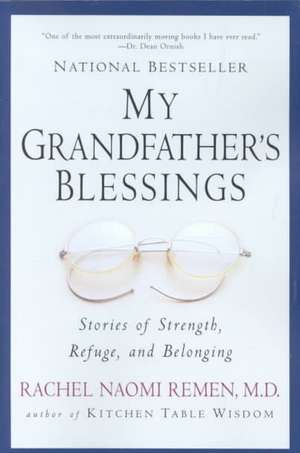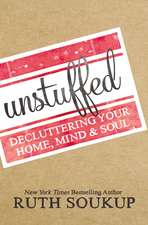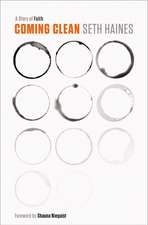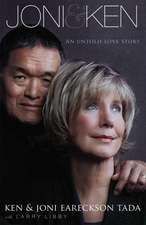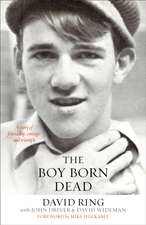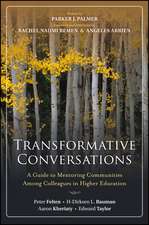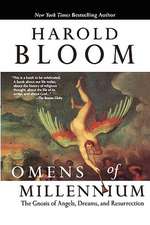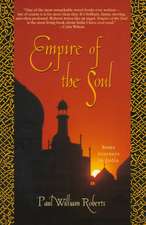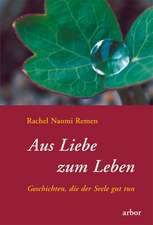My Grandfather's Blessings: Stories of Strength, Refuge, and Belonging
Autor Rachel Naomi Remenen Limba Engleză Paperback – 31 mar 2001 – vârsta de la 18 ani
In My Grandfather's Blessings, Rachel Naomi Remen, a cancer physician and master storyteller, uses her luminous stories to remind us of the power of our kindness and the joy of being alive.
Dr. Remen's grandfather, an orthodox rabbi and scholar of the Kabbalah, saw life as a web of connection and knew that everyone belonged to him, and that he belonged to everyone. He taught her that blessing one another is what fills our emptiness, heals our loneliness, and connects us more deeply to life.
Life has given us many more blessings than we have allowed ourselves to receive. My Grandfather's Blessings is about how we can recognize and receive our blessings and bless the life in others. Serving others heals us. Through our service we will discover our own wholeness—and the way to restore hidden wholeness in the world.
Dr. Remen's grandfather, an orthodox rabbi and scholar of the Kabbalah, saw life as a web of connection and knew that everyone belonged to him, and that he belonged to everyone. He taught her that blessing one another is what fills our emptiness, heals our loneliness, and connects us more deeply to life.
Life has given us many more blessings than we have allowed ourselves to receive. My Grandfather's Blessings is about how we can recognize and receive our blessings and bless the life in others. Serving others heals us. Through our service we will discover our own wholeness—and the way to restore hidden wholeness in the world.
Preț: 113.42 lei
Nou
Puncte Express: 170
Preț estimativ în valută:
21.71€ • 22.58$ • 17.92£
21.71€ • 22.58$ • 17.92£
Carte disponibilă
Livrare economică 25 martie-08 aprilie
Livrare express 08-14 martie pentru 38.04 lei
Preluare comenzi: 021 569.72.76
Specificații
ISBN-13: 9781573228565
ISBN-10: 1573228567
Pagini: 380
Dimensiuni: 140 x 208 x 25 mm
Greutate: 0.41 kg
Editura: Riverhead Books
ISBN-10: 1573228567
Pagini: 380
Dimensiuni: 140 x 208 x 25 mm
Greutate: 0.41 kg
Editura: Riverhead Books
Cuprins
My Grandfather's Blessings Introduction
I. Receiving Your Blessings
Blessing
Wrestling with the Angel
The Shell Game
The Spice of Life
Lot's Wife
Having What You Have
Letting Go
Owning
Keeping It Together
At the End of the Day
Remembering
Getting Real
What Matters
Teachers Everywhere
You Have to Be Present to Win
Knowing the Heart
Counting Your Chickens
L'Chaim!II. Becoming a Blessing
Getting It Right
The Gift
Being Used
Seeing the Buddha Seed
Simply Natural
All in the Family
Transmission
Bearing Witness
The Trajectory
Holding On to the Heart
Lost and Found
Finding New Eyes
Strengthening Life
The Friend
Wisdom
III. Finding Strength, Taking Refuge
The Meeting Place
Pearls of Wisdom
The Way Through
Right Protection
From the Heart
Wholeness
The Link
Getting Clear
Being Fed
When Somebody Knows
A Place of Refuge
Coming Home
In the Gray Zone
Finding the Center
In the Beginning
Call Home
Broken
Promises, Promises
IV. The Web of Blessings
Belonging
Lifeline
Learning to Serve
We Are Enough
Finding the Connection
Breathing In and Breathing Out
The Gift of Service
Fellow Travelers
The Laying on of Hands
Choosing Your Battles
Heaven and Hell
The Wise Man
How the World Is Made
One Little Candle
Greater Than the Sum of Its Parts
V. Befriending Life
The Game
Knowing Life
Loving Life
Eggs
Finding the Way
When It Works
Habit
The Gift of New Eyes
Making a Difference
The Bottom Line
Crazy Clean
Integrity
The Path
A Matter of Life and Death
The Mirror
Who Serves?
Beyond the American Way
The Emperor's New Clothes
Forgiveness
The Gift of the Magi
Completion
Celebration
VI. Restoring the World
Lineage
Beyond Words
The Final Patient
Mystery
A Question of Style
On the Cutting Edge
Mary
After Dark
The Thirty-six
Finding Safety
The Way It Is
The Presence of God
The Friction in the System
The Reward
The Real Story
Acknowledgments
Permissions
I. Receiving Your Blessings
Blessing
Wrestling with the Angel
The Shell Game
The Spice of Life
Lot's Wife
Having What You Have
Letting Go
Owning
Keeping It Together
At the End of the Day
Remembering
Getting Real
What Matters
Teachers Everywhere
You Have to Be Present to Win
Knowing the Heart
Counting Your Chickens
L'Chaim!II. Becoming a Blessing
Getting It Right
The Gift
Being Used
Seeing the Buddha Seed
Simply Natural
All in the Family
Transmission
Bearing Witness
The Trajectory
Holding On to the Heart
Lost and Found
Finding New Eyes
Strengthening Life
The Friend
Wisdom
III. Finding Strength, Taking Refuge
The Meeting Place
Pearls of Wisdom
The Way Through
Right Protection
From the Heart
Wholeness
The Link
Getting Clear
Being Fed
When Somebody Knows
A Place of Refuge
Coming Home
In the Gray Zone
Finding the Center
In the Beginning
Call Home
Broken
Promises, Promises
IV. The Web of Blessings
Belonging
Lifeline
Learning to Serve
We Are Enough
Finding the Connection
Breathing In and Breathing Out
The Gift of Service
Fellow Travelers
The Laying on of Hands
Choosing Your Battles
Heaven and Hell
The Wise Man
How the World Is Made
One Little Candle
Greater Than the Sum of Its Parts
V. Befriending Life
The Game
Knowing Life
Loving Life
Eggs
Finding the Way
When It Works
Habit
The Gift of New Eyes
Making a Difference
The Bottom Line
Crazy Clean
Integrity
The Path
A Matter of Life and Death
The Mirror
Who Serves?
Beyond the American Way
The Emperor's New Clothes
Forgiveness
The Gift of the Magi
Completion
Celebration
VI. Restoring the World
Lineage
Beyond Words
The Final Patient
Mystery
A Question of Style
On the Cutting Edge
Mary
After Dark
The Thirty-six
Finding Safety
The Way It Is
The Presence of God
The Friction in the System
The Reward
The Real Story
Acknowledgments
Permissions
Recenzii
"This book is a gift to the world—which it is sure to bless."—Christiane Northrup, M.D., bestselling author of Women's Bodies, Women's Wisdom
"The stories in My Grandfather's Blessings are simple and profound, with healing lessons for all of us."—Andrew T. Weil, M.D.
"Rachel Naomi Remen is nature's gift to us, a genius of that elusive and crucial capacity, the human heart. She has much to teach us about healing, loving, and living."—Daniel Goleman, Ph.D., bestselling author of Emotional Intelligence
"Rachel Naomi Remen has done it again. My Grandfather's Blessings is a massage to the heart. It is a wonderful book."—Marianne Williamson, bestselling author of Illuminata
"This lovely book, like its author, is itself a blessing. Where some doctors treat symptoms, Dr. Remen heals souls."—Rabbi Harold S. Kushner, author of When Bad Things Happen to Good People
"A lovely, warm, inspiring book for the soul."—Caroline Myss, bestselling author of Anatomy of the Spirit and Why People Don't Heal
"Through a series of unpretentious, affecting vignettes, the author of the bestseller Kitchen Table Wisdom encourages readers to recognize and celebrate the unexpected blessings in their own lives...She gently illustrates her advice through simple yet powerful stories...[an] exceptional book."—Publisher's Weekly (starred review)
"The stories in My Grandfather's Blessings are simple and profound, with healing lessons for all of us."—Andrew T. Weil, M.D.
"Rachel Naomi Remen is nature's gift to us, a genius of that elusive and crucial capacity, the human heart. She has much to teach us about healing, loving, and living."—Daniel Goleman, Ph.D., bestselling author of Emotional Intelligence
"Rachel Naomi Remen has done it again. My Grandfather's Blessings is a massage to the heart. It is a wonderful book."—Marianne Williamson, bestselling author of Illuminata
"This lovely book, like its author, is itself a blessing. Where some doctors treat symptoms, Dr. Remen heals souls."—Rabbi Harold S. Kushner, author of When Bad Things Happen to Good People
"A lovely, warm, inspiring book for the soul."—Caroline Myss, bestselling author of Anatomy of the Spirit and Why People Don't Heal
"Through a series of unpretentious, affecting vignettes, the author of the bestseller Kitchen Table Wisdom encourages readers to recognize and celebrate the unexpected blessings in their own lives...She gently illustrates her advice through simple yet powerful stories...[an] exceptional book."—Publisher's Weekly (starred review)
Notă biografică
Rachel Naomi Remen, M.D. has been counseling those with chronic and terminal illness for more than twenty years. She is cofounder and medical director of the Commonweal Cancer Help Program in Bolinas, California, and is currently clinical professor of family and community medicine at the University of California at San Francisco School of Medicine.
Extras
Chapter OneReceiving Your Blessings
Most of us have been given many more blessings than we have received. We do not take time to be blessed or make the space for it. We may have filled our lives so full of other things that we have no room to receive our blessings. One of my patients once told me that she has an image of us all being circled by our blessings, sometimes for years, like airplanes in a holding pattern at an airport, stacked up with no place to land. Waiting for a moment of our time, our attention.
People with serious illness have often let go of a great deal; their illness has created an opening in their lives for the first time. They may discover ways to receive all the blessings they are given, even those that were given long ago. Such people have shown me how to receive my blessings.
Many years ago I cared for a woman called Mae Thomas. Mae had grown up in Georgia and while she had lived in Oakland, California, for many years, she had in some profound way never left the holy ground of her childhood. She had worked hard all her life, cleaning houses in order to raise seven children and more than a few grandchildren. By the time I met her, she had grown old and was riddled with cancer.
Mae celebrated life. Her laugh was a pure joy. It made you remember how to laugh yourself. All these years later, just thinking of her makes me smile. As she became sicker, I began to call her every few days to check in on her. She would always answer the phone in the same way. I would say “Mae, how ya doin’?” and she would chuckle and reply, “I’m blessed, Sister. I am blessed.”
The night before she died, I called, and her family had brought the phone to her. “Mae,” I said. “It’s Rachel.” I could hear her coughing and clearing her throat, looking to find breath enough to speak in a lung filled with cancer, willing herself past a fog of morphine to connect to my voice. Tears stung my eyes. “Mae,” I said. “It’s Rachel. How ya doin’?” There was a sound I could not identify, which slowly unwrapped itself into a deep chuckle. “I’m blessed, Rachel. I am blessed,” she told me. Mae was one of those people. And so, perhaps, are we all.
Martin Buber reminds us that just to live is holy. Just to be is a blessing. If Buber is right, what keeps us from receiving life’s blessings? It is not always so simple a thing as a lack of time. Often we may not recognize a blessing when it is given, or we may have ideas about life that keep us from experiencing what we already have. Sometimes we become frozen in the past or unaware of the potential in the present. We may even come to feel entitled to what has been given us by grace. Or we may become so caught up in what is missing in the world that we allow our hearts to break. There are many ways to feel empty in the midst of our blessings.
We can bless others only when we feel blessed ourselves. Blessing life may be more about learning how to celebrate life than learning how to fix life. It may require an appreciation of life as it is and an acceptance of much in life that we cannot understand. It may mean developing an eye for joy. It is not necessary to sit in judgment in order to move things forward, and our anger may not be the most potent tool for change. Most important, it requires the humility to know that we are not in this task of restoring the world alone.
Larry knew none of these things. He and his wife had been coming to see me as a couple for a few months. His wife came to their final appointment alone. “Where is Larry?” I asked her. “He got a call from Washington,” she told me. “He was still on the phone when I left.” “But didn’t he promise to take Wednesdays off?” I asked. She looked at me and just smiled. “I’m leaving,” she told me. “I thought if I could get him here, he might focus on me and the kids long enough for me to tell him.”
My heart sank. I had met Larry ten years before when he was first diagnosed with non-Hodgkin’s lymphoma. He was twenty-nine at the time, a young stockbroker with a promising future. Two words from a doctor had taken all that away. Larry and his wife had fought back. Deeply in love, they had supported each other through a year of brutal chemotherapy. Their children were small, and there was much to live for. But eight months after his chemotherapy was complete, the cancer returned. This time Larry had a bone marrow transplant. Back then one out of two people who underwent this procedure died. Larry took this chance because he loved life fiercely. And he was one of the lucky ones.
He emerged from this treatment a changed man. “There is more to life than making money,” he had told me back then. Convinced that his life had been spared for a reason, he felt he had to use his time to make a difference. He left the world of business and began working in the new field of conservation. Over the next ten years, conservation became a nationwide movement, and Larry became a man possessed. He began working a fifty-hour week. And then a sixty-hour week. Now he traveled almost constantly and, when he was at home, worked far into the night by fax and e-mail. He ate and slept irregularly. Months went by without his having a talk with his children, an evening with his wife, or any time for himself. He lived on the edge of burnout. But there was always something more to be done, another project, another cause. His wife and children had been lonely at first, but gradually they had built a life without him. “Tell him that I would like to see him,” I told his wife.
She nodded. “I’ll tell him after I give him the news,” she said.
Larry came in a few days later. He sat down wearily in the chair opposite. I was shocked at his appearance. “Carol said you wanted to talk with me.”
“Yes,” I said. “She told me she was leaving.”
“Yes,” he replied. “She told me, too.”
He began to cry. “Ten years ago, I was losing my life,” he told me. “I didn’t lose it then, but I’ve lost it now.”
“What was it like for you back then?” I asked him.
“Desperate,” he said. “Life was slipping through my fingers. I felt that I was running out of time.” He paused. “I still feel that way,” he told me. “The world is dying. We may not have another chance.”
We sat looking at each other in silence. My heart ached for this good man. “When was the last time that you ate with your family?” I asked him.
He shook his head. “I don’t remember.”
“Or the last time you went to sleep without setting an alarm clock?” He shook his head again. “Do you remember the last time that you played a game or read a story to your children?”
“I don’t remember,” he said softly.
“Larry, would you treat a spotted owl in this way?” He looked down at the floor and shook his head. I saw that he had begun to cry again.
“I don’t think I can go on,” he said.
I told him that I understood how important his work was. Silently he nodded. “Has serving life made you happy?”
He looked at me, confused. “How can serving life make you happy?” he asked me. “Service requires sacrifice.”
But perhaps not. One of the fundamental principles of real service is taught many times a day aboard every airplane in the United States. Larry, who flies more than a million miles every year, had heard it hundreds of times without recognizing its relevance to him. It is the part just before takeoff when the stewardess says, “If the cabin loses pressure, the oxygen masks will fall from above. Put your own mask on first before you try to help the person next to you.” Service is based on the premise that all life is worthy of our support and commitment. For Larry, this was true of every life except his own.
If I wished to defeat those who wanted to use their lives to make a difference, this is exactly the way in which I would go about it. Few such people would be tempted from their purpose by fame, or power, or even by wealth. But I could confuse them and stop them in just the same way Larry found himself stopped. I could use their own dedication against them, driving them to work until they became so depleted and empty that they could no longer go on. I would make certain that they never discovered that blessing life is about filling yourself up so that your blessings overflow onto others.
—Reprinted from My Grandfather’s Blessings by Rachel Naomi Remen by permission of Riverhead, a member of Penguin Putnam Inc. Copyright © 2001 by Rachel Naomi Remen. All rights reserved. This excerpt, or any parts thereof, may not be reproduced in any form without permission.
Most of us have been given many more blessings than we have received. We do not take time to be blessed or make the space for it. We may have filled our lives so full of other things that we have no room to receive our blessings. One of my patients once told me that she has an image of us all being circled by our blessings, sometimes for years, like airplanes in a holding pattern at an airport, stacked up with no place to land. Waiting for a moment of our time, our attention.
People with serious illness have often let go of a great deal; their illness has created an opening in their lives for the first time. They may discover ways to receive all the blessings they are given, even those that were given long ago. Such people have shown me how to receive my blessings.
Many years ago I cared for a woman called Mae Thomas. Mae had grown up in Georgia and while she had lived in Oakland, California, for many years, she had in some profound way never left the holy ground of her childhood. She had worked hard all her life, cleaning houses in order to raise seven children and more than a few grandchildren. By the time I met her, she had grown old and was riddled with cancer.
Mae celebrated life. Her laugh was a pure joy. It made you remember how to laugh yourself. All these years later, just thinking of her makes me smile. As she became sicker, I began to call her every few days to check in on her. She would always answer the phone in the same way. I would say “Mae, how ya doin’?” and she would chuckle and reply, “I’m blessed, Sister. I am blessed.”
The night before she died, I called, and her family had brought the phone to her. “Mae,” I said. “It’s Rachel.” I could hear her coughing and clearing her throat, looking to find breath enough to speak in a lung filled with cancer, willing herself past a fog of morphine to connect to my voice. Tears stung my eyes. “Mae,” I said. “It’s Rachel. How ya doin’?” There was a sound I could not identify, which slowly unwrapped itself into a deep chuckle. “I’m blessed, Rachel. I am blessed,” she told me. Mae was one of those people. And so, perhaps, are we all.
Martin Buber reminds us that just to live is holy. Just to be is a blessing. If Buber is right, what keeps us from receiving life’s blessings? It is not always so simple a thing as a lack of time. Often we may not recognize a blessing when it is given, or we may have ideas about life that keep us from experiencing what we already have. Sometimes we become frozen in the past or unaware of the potential in the present. We may even come to feel entitled to what has been given us by grace. Or we may become so caught up in what is missing in the world that we allow our hearts to break. There are many ways to feel empty in the midst of our blessings.
We can bless others only when we feel blessed ourselves. Blessing life may be more about learning how to celebrate life than learning how to fix life. It may require an appreciation of life as it is and an acceptance of much in life that we cannot understand. It may mean developing an eye for joy. It is not necessary to sit in judgment in order to move things forward, and our anger may not be the most potent tool for change. Most important, it requires the humility to know that we are not in this task of restoring the world alone.
Larry knew none of these things. He and his wife had been coming to see me as a couple for a few months. His wife came to their final appointment alone. “Where is Larry?” I asked her. “He got a call from Washington,” she told me. “He was still on the phone when I left.” “But didn’t he promise to take Wednesdays off?” I asked. She looked at me and just smiled. “I’m leaving,” she told me. “I thought if I could get him here, he might focus on me and the kids long enough for me to tell him.”
My heart sank. I had met Larry ten years before when he was first diagnosed with non-Hodgkin’s lymphoma. He was twenty-nine at the time, a young stockbroker with a promising future. Two words from a doctor had taken all that away. Larry and his wife had fought back. Deeply in love, they had supported each other through a year of brutal chemotherapy. Their children were small, and there was much to live for. But eight months after his chemotherapy was complete, the cancer returned. This time Larry had a bone marrow transplant. Back then one out of two people who underwent this procedure died. Larry took this chance because he loved life fiercely. And he was one of the lucky ones.
He emerged from this treatment a changed man. “There is more to life than making money,” he had told me back then. Convinced that his life had been spared for a reason, he felt he had to use his time to make a difference. He left the world of business and began working in the new field of conservation. Over the next ten years, conservation became a nationwide movement, and Larry became a man possessed. He began working a fifty-hour week. And then a sixty-hour week. Now he traveled almost constantly and, when he was at home, worked far into the night by fax and e-mail. He ate and slept irregularly. Months went by without his having a talk with his children, an evening with his wife, or any time for himself. He lived on the edge of burnout. But there was always something more to be done, another project, another cause. His wife and children had been lonely at first, but gradually they had built a life without him. “Tell him that I would like to see him,” I told his wife.
She nodded. “I’ll tell him after I give him the news,” she said.
Larry came in a few days later. He sat down wearily in the chair opposite. I was shocked at his appearance. “Carol said you wanted to talk with me.”
“Yes,” I said. “She told me she was leaving.”
“Yes,” he replied. “She told me, too.”
He began to cry. “Ten years ago, I was losing my life,” he told me. “I didn’t lose it then, but I’ve lost it now.”
“What was it like for you back then?” I asked him.
“Desperate,” he said. “Life was slipping through my fingers. I felt that I was running out of time.” He paused. “I still feel that way,” he told me. “The world is dying. We may not have another chance.”
We sat looking at each other in silence. My heart ached for this good man. “When was the last time that you ate with your family?” I asked him.
He shook his head. “I don’t remember.”
“Or the last time you went to sleep without setting an alarm clock?” He shook his head again. “Do you remember the last time that you played a game or read a story to your children?”
“I don’t remember,” he said softly.
“Larry, would you treat a spotted owl in this way?” He looked down at the floor and shook his head. I saw that he had begun to cry again.
“I don’t think I can go on,” he said.
I told him that I understood how important his work was. Silently he nodded. “Has serving life made you happy?”
He looked at me, confused. “How can serving life make you happy?” he asked me. “Service requires sacrifice.”
But perhaps not. One of the fundamental principles of real service is taught many times a day aboard every airplane in the United States. Larry, who flies more than a million miles every year, had heard it hundreds of times without recognizing its relevance to him. It is the part just before takeoff when the stewardess says, “If the cabin loses pressure, the oxygen masks will fall from above. Put your own mask on first before you try to help the person next to you.” Service is based on the premise that all life is worthy of our support and commitment. For Larry, this was true of every life except his own.
If I wished to defeat those who wanted to use their lives to make a difference, this is exactly the way in which I would go about it. Few such people would be tempted from their purpose by fame, or power, or even by wealth. But I could confuse them and stop them in just the same way Larry found himself stopped. I could use their own dedication against them, driving them to work until they became so depleted and empty that they could no longer go on. I would make certain that they never discovered that blessing life is about filling yourself up so that your blessings overflow onto others.
—Reprinted from My Grandfather’s Blessings by Rachel Naomi Remen by permission of Riverhead, a member of Penguin Putnam Inc. Copyright © 2001 by Rachel Naomi Remen. All rights reserved. This excerpt, or any parts thereof, may not be reproduced in any form without permission.
Descriere
From the bestselling author of "Kitchen Table Wisdom" comes a book that will wrap the warmth of a wise grandfather's love and the blessings of life around every reader. As a small child, Remen sat at the feet of her grandfather, an orthodox rabbi and scholar of the kabbalah, and learned the secret of life that she now shares: that love and blessings given to others heals our loneliness, unhappiness, and in fact all our wounds.
